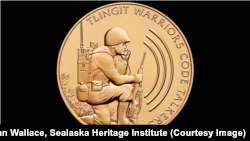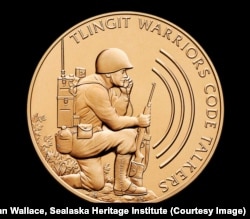American Richard Bean, Sr., died with a secret. He was a war hero, but nobody knew about it for years.
Bean and four other Alaska Natives were recently honored in their home state for saving the lives of many soldiers during World War II.
As young men, Bean and the others served in the United States military. During the war, they made good use of their mother tongue, the Tlingit language. As children, they could not speak Tlingit at schools in their southeast Alaska villages. But in the U.S. military, their officers asked them to use their native language to help the military. When they spoke in a code that used Tlingit, the Japanese could not understand them. They did the same thing as other, more famous American soldiers: the Navajo Code Talkers.
Rosita Worl is president of the Sealaska Heritage Institute, a nonprofit group set up to protect and strengthen the cultures of Alaska's Tlingit, Haida and Tsimshian tribes.
Worl told the Associated Press that, when the Tlingit soldiers were children, teachers and religious workers suppressed their language. Punishments for students who spoke their language included having their mouths washed out with soap and their hands struck by sticks, she said.
Until recent years, however, most people did not know what the Alaska Natives had done. The U.S. military for a time kept the unbroken codes secret in case they were needed in future wars.
"Their orders were not to talk about it," said Ozzie Sheakley, a Tlingit leader who once served in the U.S. Army. "They took those orders seriously."
Their families had no idea that the five men were heroes. All of them were from small towns on Alaska's Panhandle: soldiers Richard Bean, Sr. of Hoonah, and Robert "Jeff" David, Sr. of Haines; Sitka brothers and Navy men Mark Jacobs, Jr. and Harvey Jacobs; and George Lewis Jr., who was also from Sitka and is believed to have served in the Army.
Ron Williams never knew either, even though he and Richard Bean were extremely close. Bean was his uncle.
Williams said there was only one small piece of evidence. His uncle told him a platoon commander heard him speaking Tlingit with fellow Code Talker Jeff David while the two were fighting in the Philippines together. The commander asked if the men would like to work on communications, then gave each a small radio. But that was the end of Bean's story, and Williams never asked for more, because it seemed his uncle did not want to talk about it. Richard Bean died in 1985.
"Even the guys that knew him all his life, you know, they didn't know what he did either because he never said anything about it," Williams said.
David never said anything about it to his son, Jeff David, Jr., either.
"He just said he was in special services, and that was as far as he put it," the son said. "And he was stationed in the Philippines for a while."
The military released information about the Navajo Code Talker program in 1968. But it would be many more years before the U.S. government recognized the work of Tlingit servicemen.
In 2013, Congress recognized the Code Talkers from 33 tribes, including the Tlingit men, who were awarded silver medals after their deaths.
Thinking of the national honors, former Alaska state representative and Tlingit military veteran Bill Thomas decided it was time for state recognition. Alaska lawmakers agreed when Thomas pushed for the idea along with the help of the Sealaska Heritage Institute. In March, legislators passed an official order honoring the Tlingit Code Talkers.
Learning about the important part these men played in history was a big surprise for the family of George Lewis Jr.
His son, Ray Lewis, was born after the war and never even knew his father was in the military. There are no military records in the family to even tell what part of the military his father served in, he said.
It was a great honor to learn his father was part of such important work.
“I’m very proud of it,” Ray Lewis said. “My father was instrumental in saving a lot of lives out there.”
I’m Jill Robbins.
Rachel D'Oro reported on this story for the Associated Press. Dr. Jill Robbins adapted this story for Learning English. George Grow was the editor.
Does your town have a war hero? Tell us about her or him. Write to us in the comments section.
_____________________________________________________________
Words in This Story
tongue – n. a spoken language
code – n. a system of signals for communication
soap – n. a cleansing agent
panhandle - n. a part of a land area that is narrow and sticks out from a larger area
uncle – n. the brother of one’s father or mother
platoon - n. a group or team of soldiers
proud – adj. very pleased





